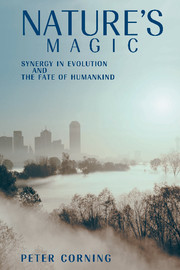Book contents
- Frontmatter
- Contents
- 1 Prologue: The New Evolutionary Paradigm
- 2 The “Enchanted Loom”
- 3 The Magic Castle
- 4 “Black Magic”
- 5 The Synergism Hypothesis
- 6 “The Sorcerer's Apprentice”
- 7 Conjuring Human Evolution: The Synergistic Ape
- 8 Conjuring History: Does Cultural Evolution Have an “Arrow”?
- 9 The Science of History
- 10 Conjuring the Future: What Can We Predict?
- Afterword
- Notes
- References
- Index
9 - The Science of History
Published online by Cambridge University Press: 22 August 2009
- Frontmatter
- Contents
- 1 Prologue: The New Evolutionary Paradigm
- 2 The “Enchanted Loom”
- 3 The Magic Castle
- 4 “Black Magic”
- 5 The Synergism Hypothesis
- 6 “The Sorcerer's Apprentice”
- 7 Conjuring Human Evolution: The Synergistic Ape
- 8 Conjuring History: Does Cultural Evolution Have an “Arrow”?
- 9 The Science of History
- 10 Conjuring the Future: What Can We Predict?
- Afterword
- Notes
- References
- Index
Summary
I believe in no fixed law of development. …
I believe … in no law of necessary development.
Charles DarwinI magine – if you can – an orderly, harmonious, law-governed universe, a stately celestial procession with the Earth and humankind at the very center of it. “The music of the spheres,” an ancient and once venerated phrase, evokes a time long ago when this was the prevailing view of the cosmos. Indeed, the image of an overarching cosmic harmony can be traced all the way back to one of the “founding fathers” of Western science, Pythagoras of Samos (a small island in the Aegean), in the sixth century bc. Pythagoras is legendary as the developer of the theorem for right triangles that bears his name (c2 = a2 + b2), but far more important was his seminal discovery – now a commonplace – that mathematics can provide a powerful tool for understanding the physical world.
Pythagoras and “The Music of the Spheres”
The story handed down to us is that Pythagoras had a flash of insight one day when he passed by a blacksmith's shop and noticed that the anvils, when struck with a hammer, produced differently pitched sounds. We are told that Pythagoras rushed home to test his hunch. Experimenting with gut-strings and weights, he confirmed that differences among them corresponded to variations in pitch.
- Type
- Chapter
- Information
- Nature's MagicSynergy in Evolution and the Fate of Humankind, pp. 278 - 299Publisher: Cambridge University PressPrint publication year: 2003



